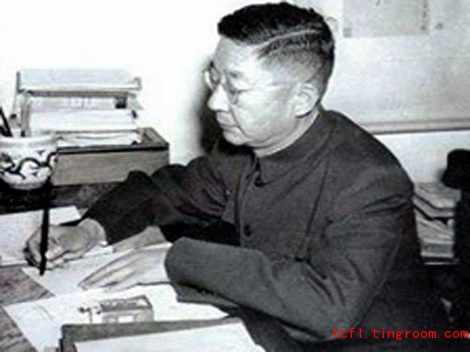
Lao She (1899-1966) was born of Manchu descent in Beijing. His father, who was a guard soldier, died in a street battle during the Boxer uprising. Fatherless since early childhood, Lao She worked his way through Peking Teacher's College. After graduation he supported himself and his mother through a series of teaching and administrative post. He served as a principal of an elementary school at the age of 17, and later he was a district supervisor. Lao She spent the years from 1924 to 1929 in London, where he taught Chinese at the School of Oriental and African Studies. By reading among others the novels of Charles Dickens, Lao She improved his English, and decided to start his fist novel.
In 1931 Lao She returned to China and continued to write and teach in various universities. Partly modeled on Fielding's Tom Jones, Lao She turned to humor. He reversed his early individualist theme and stressed the futility of the individual's struggle against society as a whole. In Rickshaw Boy Lao She traced the degrading and ruin of a industrious Peking rickshaw puller, who finally dies on a snowy night.
The outbreak of the Sino-Japanese War (1937-1945) radically altered Lao She's views. Between the years 1937 and 1945 he wrote a number of plays, worked as a propagandist, and headed the All-China Anti-Japanese Writers Federation.
Between the years 1946 and 1949 Lao She lived in the United States on a cultural grant at the invitation of the Department of State. When the People's Republic was established in 1949, Lao She returned to China.
He was a member of the Cultural and Educational Committee in the Government Administration Council, a deputy to the National People's Congress, a member of the Standing Committee of the Chinese People's Political Consultative Conference, vice-chairman of the All-China Federation of Literature and Art and vice-chairman of the union of Chinese Writers as well as chairman of the Beijing Federation of Literature and Art. He was named a "People's Artist" and a "Great Master of Language".
Among Lao She's most frequently performed plays is Teahouse, which was written in 1957. The events are set in the Beijing teahouse of Wang Lifa during three different periods: 1898 under the empire, the 1910s under the warlords and around 1945 after World War Two. Towards the end, Wang and his friends confess the failure of their lives. The teahouse is requisitioned as a club and Wang is offered a job as doorman -- however, he has already hanged himself -- The Beijing People's Art Theatre performed the play in 1980 in West Germany and France.



